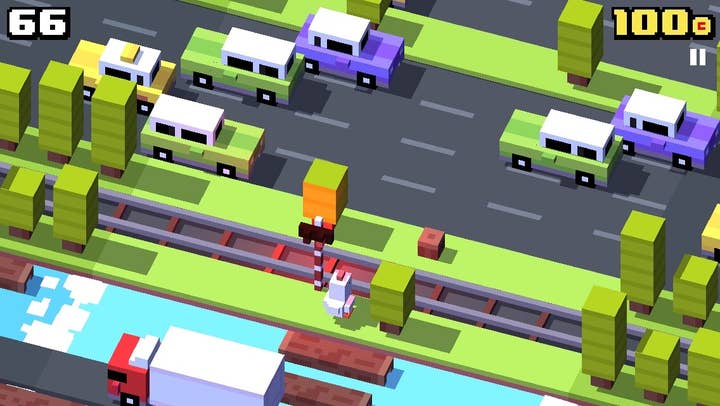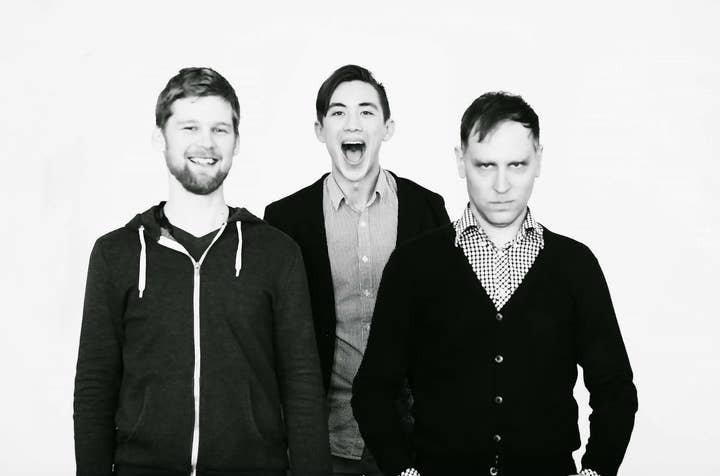Crossy Road: The freemium game that really doesn't want more of your money
Hipster Whale's Matt Hall and Andy Sum have no desire to become "mobile moguls"
The best single session of Casual Connect Europe took place in one of its smaller rooms, modestly filled with developers still nursing their morning coffee. The Binary Family's Thorsten Rauser shook the crowd to attention with an impassioned speech, equal parts warning and lament, at the dwindling respect for ideas in a casual market seemingly intent on starting with the desired revenue and working backwards from there.
Was Rauser entirely fair in his assessment? Some would argue the point, but more than a few developers present shifted uncomfortably in their seats. Among them were Matt Hall and Andy Sum, the co-creators of Crossy Road, and as close to conquering heroes as Casual Connect had to offer. When they entered the room, just as Rauser was really working up a head of steam, they couldn't help but wonder: Is he talking about us?
"When it did well, I was like, 'Er, Andy? Are we supposed to 'scale' now?'"
Matt Hall
They could be forgiven the confusion. Hipster Whale's brightly polished debut is certainly riding high in free download charts all over the world, but any discomfort Hall and Sum felt was more down to good nature than any nagging sense of guilt. Crossy Road is orders of magnitude more successful than either had dared hope, and while they are never less than humble when discussing that success, there are certain assumptions about ascendant free-to-play developers that the pair could happily live without.
"We don't want to get any bigger," Hall says, clearly aware of how that might sound to the multitude of mobile developers without 40 million (and climbing) downloads to celebrate. "When it did well, I was like, 'Er, Andy? Are we supposed to 'scale' now?
"There's so many different ways we could take it. We have all of these players. Maybe we could just be the sort of publisher that gives them a new game every month. Maybe that's a smart thing to do."

Hall shakes his head at the idea, his voice thick with sarcasm. Neither has any desire to become, as Sum terms it, "a mobile mogul." For Hipster Whale, the lure of the casual market is all about reach, not revenue. It might be wise to sell up, I suggest, to leave Crossy Road before it becomes an albatross about their necks.
"Well," Hall says, smiling, "it's already that."
In the meantime, both Hall and Sum are determined for their success to yield something positive for the community - in their native Australia and as far beyond as their schedules will allow. Casual Connect Europe is just one of many speaking engagements planned for this year, and they are committed to "opening the books" on aspects of Crossy Road's success that most developers in their position would keep a guarded secret. The mobile market hasn't looked so daunting since the iPhone changed the game entirely almost eight years ago. In such a precarious environment, Hall says, a positive story can go a long way.
"We didn't even talk about how to make money from the game until we were halfway done"
Andy Sum
"Milkbag Games, the guys who made Disco Zoo, they opened up the books and told us exactly what they earned in their first week. It made us realise, okay, as long as you've got people playing your game you can do pretty well out of advertising. If it wasn't for them sharing that information with us we probably would never have made Crossy Road."
Hall had been working in mobile for around five years, but only ever with premium pricing. Sum had worked on several PC releases but, at just 24, he was still gathering valuable experience. What they shared was a common goal: to build as big an audience as possible without resorting to the dubious strategies with which so many free-to-play casual games are associated.
"We wanted to make a phenomenon," Hall says. "That was actually the intention. You might as well shoot for the moon, right? We wanted to make sure that people were not only playing it everyday, but also that it was something people would tell their friends about. Those two concepts multiply one another."
Of course, both Hall and Sum realise that 40 million downloads requires a fair amount of good fortune, too, but they are justifiably proud of what they have created. Crossy Road, though simple, sings of quality and a careful eye for detail: ebullient art direction (courtesy of Hipster Whale's Ben Weatherall), charming sound-effects, a long and vivid cast of playable characters. The most compelling reasons to keep playing Crossy Road, and to share that experience, have nothing to do with squeezing a few extra bucks out of the user.
"We didn't even talk about how to make money from the game until we were halfway done," says Sum, who has a tendency to let Hall do the talking much of the time. "We wanted to make a popular game, but not necessarily one that made much money. We certainly weren't aiming for Candy Crush Saga at all."
"I would never, ever buy a pack of coins for my daughter. It creates a false perception of value"
Matt Hall
"Per user, the money's quite low, and that was intentional," Hall adds, pointing out that the UK is the only place where Crossy Road has even approached the top 25 in the top-grossing chart. "I mean, you can't just make anything and release it on the App Store. That should be obvious to everybody by now. People need to be able to discover your game or tell their friends about it. If you've decided you don't want to put Twitter or sharing links in your game because it cheapens the experience, well, your game will not do well. There are concessions you have to make."
However, Hipster Whale's team of three is very clear on this: those concessions should not be in the name of monetisation, and at the expense of the parents who inevitably pay the bills. "I've got kids," says Hall. "I would never, ever buy a pack of coins for my daughter. It creates a false perception of value."
There is a line with free-to-play, and for both Hall and Sum consumables are on the wrong side. The troubling aspect is that, with so many games using those very tactics, audience expectations of what a casual game entails has noticeably changed. Hipster Whale receives requests for consumables, save-me buttons, and myriad other ways to subvert the experience in exchange for money every single day. In his memorable opening session, Thorsten Rauser questioned what that acquiescence would mean for the future of casual gaming - Hall shares at least some of his concerns.
"It just goes to show how it has twisted perception," he says. "It's the new paradigm."

I mention another great session, at a different conference, in which Teut Weidemann pulled apart the monetisation strategies of League of Legends and found it sorely wanting. Give him control of Riot Games for a few weeks, Weidemann said, and he could double the revenue of what is already one of the more lucrative games in existence. At that exact moment, I could hear dozens of hands rubbing together in perfect unison.
But Weidemann added a caveat: in making those changes, in chasing that money, it would almost certainly destroy what made so many people love the game in the first place. There would be twice as much revenue, but the happiness of the players would be a necessary sacrifice. Hall and Sum nod in agreement. They have even resisted the introduction of interstitial advertising as a way of boosting Crossy Road's profits. If it risks alienating even 5 per cent of the game's audience it's simply not up for discussion, let alone an A/B test.
"We don't have to spend anything on the game to keep it going. We're not looking for an exit"
Matt Hall
"We have an indie sensibility," Hall says. "It's kind of odd that it did this in this way. We never planned for it. From the free-to-play people, there's a lot of scoffing. But we don't have to spend anything on the game to keep it going. We're not looking for an exit. We can just do whatever we feel like now. I'll scale down before I scale up."
The goal for Hipster Whale, Hall emphasises, is creative freedom, and Crossy Road has secured that freedom for the next couple of projects at least. Will they stick with free-to-play, I ask, given how dominant the model has become, and how well this friendlier approach has treated them? The answer arrives without a moment's hesitation.
"No," Hall says, shaking his head. "We just wanted to make what we want to make. Most games don't fit free-to-play. It's only the future if you want to make large amounts of money, and nobody needs to make that kind of money. Honestly. Does every free-to-play game have to be about maximising revenue per user?
"We could be making a lot more money per user. But, you know what? We don't want to."

